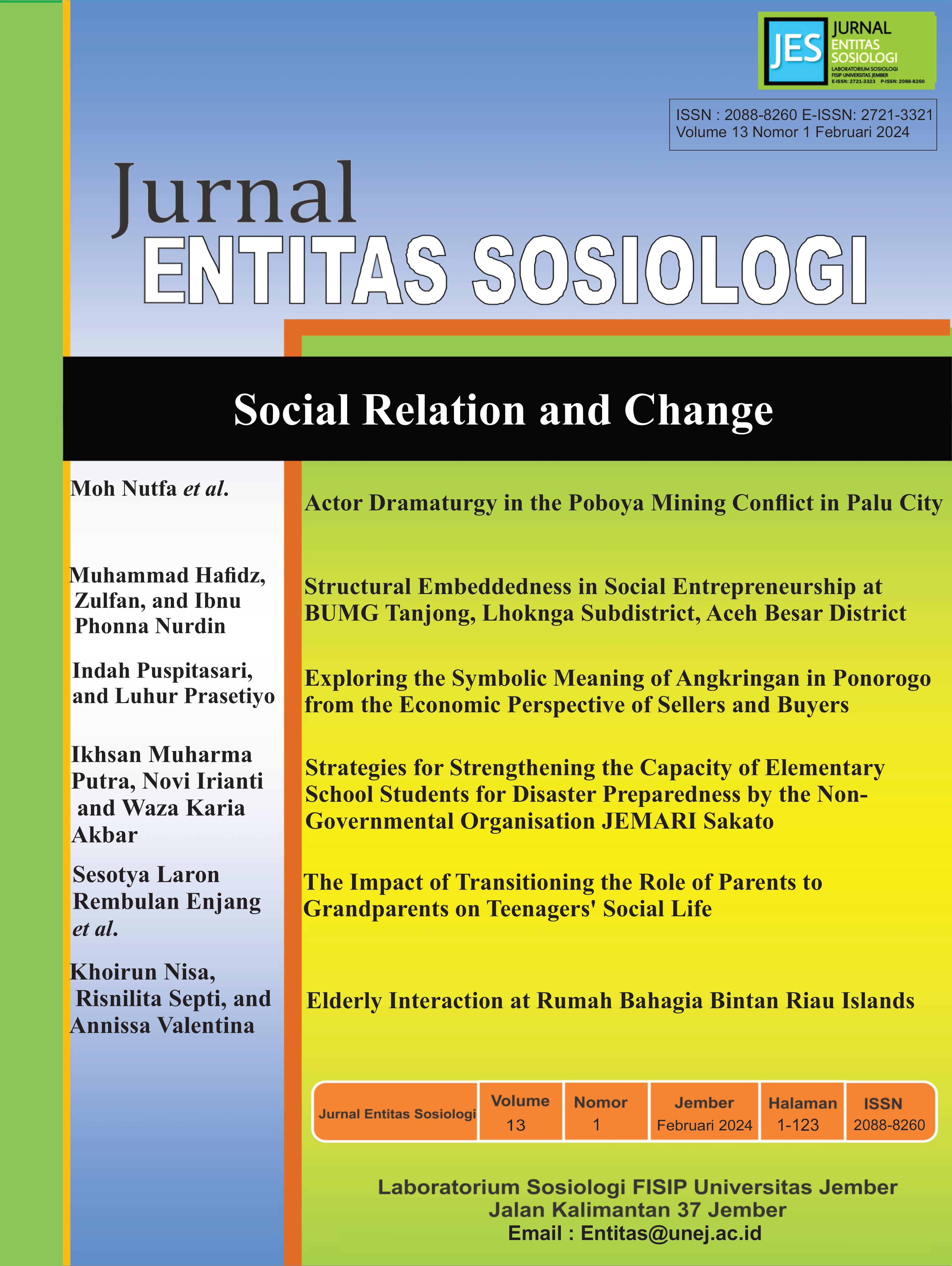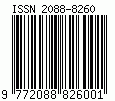Strategi Penguatan Kapasitas Siswa Sekolah Dasar untuk Kesiapsiagaan Bencana oleh Lembaga Swadaya Masyarakat JEMARI Sakato
Strategies for Strengthening the Capacity of Elementary School Students for Disaster Preparedness by the Non-Governmental Organisation JEMARI Sakato
Abstract
Lembaga Swadaya Masyarakat (LSM) merupakan organisasi masyarakat di luar pemerintah yang bersifat sukarela dan untuk membantu kinerja pemerintah dan ikut mengawasi jalannya pemerintahan. LSM JEMARI Sakato memiliki kompetensi riset aksi, advokasi, monitoring dan evaluasi serta pengembangan metode fasilitasi efektif, interaktif, partisipatif. Tulisan ini berupaya mendeskripsikan strategi LSM JEMARI Sakato dalam penguatan kapasitas siswa sekolah dasar untuk kesiapsiagaan bencana melalui program Sekolah Cerdas Bencana (SCB) dengan pendekatan pembelajaran orang dewasa (andragogi). Metode yang digunakan pada penelitian ini adalah metode kualitatif deskriptif. Data dikumpulkan dengan wawancara mendalam dengan teknik pemilihan informan purposive sampling. Wawancara mendalam dilakukan kepada 8 orang (3 laki-laki dan 5 Perempuan) Informan. Selain wawancara, data pendukung juga bersumber dari dokumen dan observasi lapangan di LSM JEMARI Sakato. Penelitian ini mengungkap bahwa LSM JEMARI Sakato melaksanakan Program SCB dengan strategi pembelajaran orang dewasa (andragogi). Pada pelaksanaan Program SCB selalu menyesuaikan jadwal pertemuan yang disepakati bersama, mendesain metode pembelajaran orang dewasa untuk anak-anak sekolah dasar sehingga menciptakan hubungan kepercayaan dan tanggungjawab bersama, serta solidaritas. Penguatan kapasitas siswa sekolah dengan strategi ini berhasil meningkatan kapasitas siswa, tidak hanya pada tataran pengetahuan namun terjadi peningkatan pada sikap dan perilaku kesiapsiagaan bencana.
Kata Kunci: Andragogi , Siswa Sekolah Dasar, Kesiapsiagaan, Bencana, Lembaga Swadaya Masyarakat,
Abstract
Non-governmental organizations (NGOs) are voluntary community organizations that assist the government and oversee their performance. JEMARI Sakato has competencies in action research, advocacy, monitoring, and evaluation, and the development of effective, interactive, participatory facilitation methods. This paper describes Sakato's strategy of strengthening the capacity of primary school students for disaster preparedness through the Sekolah Cerdas Bencana (SCB) program using an adult learning approach (andragogy). The method used in this study was a descriptive qualitative method. Data were collected through in-depth interviews using purposive sampling. In-depth interviews were conducted with eight informants (three male and five female). In addition to interviews, supporting data were sourced from documents and field observations at the JEMARI Sakato NGO. This research reveals that JEMARI Sakato NGO implements the SCB program with an adult learning strategy (andragogy). The implementation of the SCB Programme always adapts to a mutually agreed meeting schedule, designing adult learning methods for primary school children to create relationships of trust, shared responsibility, and solidarity. Strengthening the capacity of school students with this strategy succeeded in increasing the capacity of students, not only at the level of knowledge, but also in the attitude toward and behavior of disaster preparedness.
Keywords : Andragogi, Elementary School Students. Preparedness, Disasters, Non-Governmental Organizations.
References
Afrizal. (2014). Metode Penelitian Kualitatif. Fisip Unand.
Aprilianto. (2019). Manajemen SDM. Bering Pustaka.
Arghode, V., Brieger, E. W., & McLean, G. N. (2017). Adult learning theories: implications for online instruction. European Journal of Training and Development, 41(7), 593–609. https://doi.org/10.1108/EJTD-02-2017-0014
Bakar, K. A. (2013). Meaning of Andragogi. Al-Madinah Language Studies, 2(6).
Bastian I. (2007). Akuntansi Untuk Lsm Dan Partai Politik. Erlangga.
Budiman, A. (1995). Teori Pembangunan Dunia Ketiga. PT Gramedia Pustaka Utama.
Diah, A. A., & Syawie, M. (2015). PEMBANGUNAN KEMANDIRIAN DESA MELALUI KONSEP PEMBERDAYAAN: SUATU KAJIAN DALAM PERSPEKTIF SOSIOLOGI THE DEVELOPMENT OF RURAL RESILIENCE WITH EMPOWERING CONCEPT: A STUDY OF SOCIOLOGICAL PERSPECTIVE. Sosio Informa, 1(2), 175–188.
Fitlayeni, R., Putra, I. M., Marleni, M., Elvawati, E., & Putri, W. S. Y. (2021). Penguatan Kapasitas Pedagang dalam Resolusi Konflik Asimetris di Pasar Raya Padang Pasca Gempa. Jurnal Socius: Journal of Sociology Research and Education, 8(1), 26. https://doi.org/10.24036/scs.v8i1.216
Gaffar, A. (2006). Politik Indonesia, Transisi Menuju Demokrasi (1st ed., Vol. 1). Sinar Grafika.
Grindle. (1997). Getting Good Government: Capacity Building in the Public Sector of Developing Countries (1st ed., Vol. 1). Harvard Institute for International Development.
Jarvis, P. (1984). Andragogi—a Sign of the Times. Studies in the Education of Adults, 16(1), 32–38. https://doi.org/10.1080/02660830.1984.11730438
Kerwin, M. (1981). Andragogi in the Community College. Community College Review, 9(3), 12–14. https://doi.org/10.1177/009155218100900303
Mansour, F. (2000). Management Sumber Daya Manusia (1st ed.). Graha Ilmu.
Miles, M. B., & Huberman, A. M. (1992). Analisis Data Kualitatif; Buku Sumber Tentang Metode Metode Baru (1st ed.). Penerbit Universitas Indonesia.
Mukhtar. (2013). Metode Penelitian Deskriptif Kualitatif.
Pugalendhi, S. B., & Nakkeeran, S. kumar. (2011). The management learning tool: Andragogi. Research Papers in Economics.
Putra, I. M. (2015). Partisipasi Semu Perempuan Miskin Dalam Program Pemberdayaan Masyarakat. Jurnal Ilmiah Kajian Gender.
Putra, I. M. (2016). Implementation Participatory Learning Method for Community Development Programs Case Study; Community Recilient Development Program By NGO JEMARI Sakato. ACER-N 2016 (the 4thInternational Conference), 577–587. https://drive.google.com/file/d/0B5LwYGzI7uDxZl9EZnNmTDFYT1k/view
Ritzer, G. (2003). Sosiologi Ilmu Pengetahuan Berparadigma Ganda. Raja Grafindo Persada.
Ritzer, G., & Goodman, D. J. (2008). Teori Sosiologi Modern (T. W. B. Santoso, Ed.; 6th ed.). Kencana.
Sugiyono. (2012). Metod Penelitian Kuantitatif Kualitatif Dan R&D.
Sugiyono. (2013). Metode Penelitian Kuantitatif Kualitatif dan R dan D. Alfabeta.
Suyanto. (2011). Analisis Regresi Untuk Uji Hipotesis.











